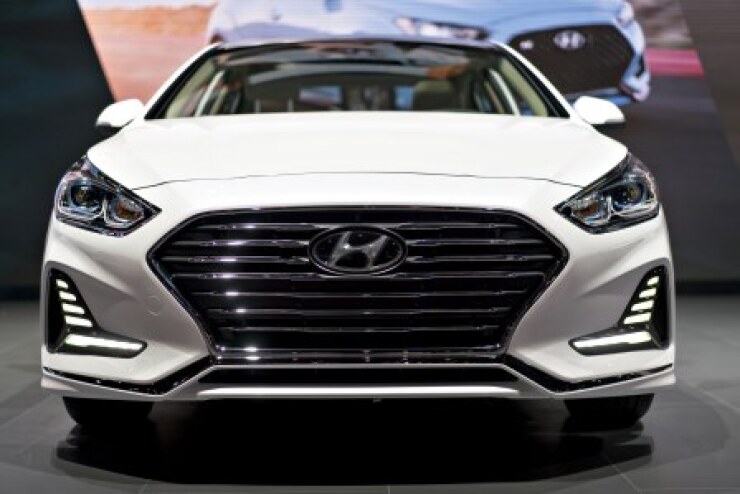Hyundai Capital America is providing investors a higher-scoring pool of borrowers in its first securitization of prime retail auto loans this year.
But the captive finance lender still faces pressures from rising delinquencies, and continues migrating toward riskier, longer-term loans in its latest asset-backed transaction of contracts underwritten through U.S. Hyundai and Kia dealers, according to Moody’s Investors Service.
Hyundai (which has an investment-grade rating of Baa1 from Moody’s) is marketing $924 million in new bonds backed by a pool of loans that has a higher collective average FICO, 750, than any HCA asset-backed transaction since the recession.
Hyundai Auto Receivables Trust (HART) 2018-A is similar to other Hyundai asset-backed deals, consisting of primarily senior notes. The transaction includes split three-year notes tranches divided between a $158 million, Class A-2-A fixed-rate tranche and Class A-2-B floating-rate notes totaling $192 million; a $230 million Class A-3 stack due 2022 and a $74.6 million Class A-4 tranche due 2024. All of the notes carry preliminary triple-A ratings from Moody’s Investors Service.

The deal also features a $202 million money-market tranche with Moody’s top-scale A-1 short-term rating.
All the A-1 and Aaa notes are backed by 7.55% credit enhancement. That includes 2.5% overcollateralization ($23.1 million) plus subordination of $16.6 million of Class B notes (rated Aa3) due 2024 and $27.8 million in Class C notes (A3), also due 2024. Additional excess spread may be applied to enhancement levels, as well, with the CE building to 3.4%.
The transaction could be enlarged with additional Class A-2-B notes; Moody’s notes that tranche has a proposed 20.8% portion of the pool, but could be increased to 55% to accommodate a market-driven upsizing.
Moody’s projects net losses of 2% over the duration of the deal’s life, similar to Hyundai Capital’s $955 million HART 2017-B transaction last August.
The lender sees rising levels of delinquencies and defaults in its otherwise “financially strong” $13.5 billion managed portfolio and recent-vintage securitizations, according to Moody’s. Hyundai is also seeing stress from lower used-car prices that are more pronounce with Hyundai- and Kia-branded vehicles than with other automakers.
The 2018-A pool has a weighted average original terms of 66 months on the underlying loans, with 62% of the pool balance tied to loans with terms over 60 months.
The portfolio is backed by $980.2 million across 55,346 loans with an average APR of 3.59% and remaining loan size of $17,711. The loans have been seasoned an average of 11 months.
Over 55% of the pool’s contracts are for passenger cars, with 41% consisting of loans for crossovers and SUVs.
This is HCA’s second transaction in 2018, following the
Net losses in the managed portfolio grew to 1.87% in 2017, from 1.68% the year prior; delinquencies over 29 days are also rising to 3.55%, compared with 3.4% in 2016 and as low as 2.21% in 2013.
The deal was underwritten by Barclays, BNP Paribas, Credit Agricole and SMBC Nikko Securities.
HCA is 80% owned by Hyundai Motor America and 20% owned by Kia Motors America. The two South Korean auto manufacturers have ties in their home country, where Hyundai owns 34% of Kia.





